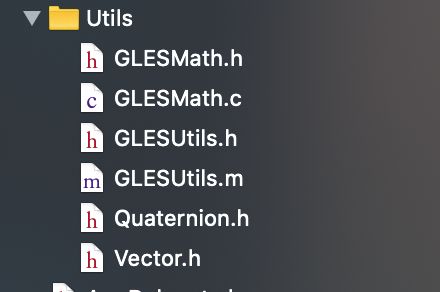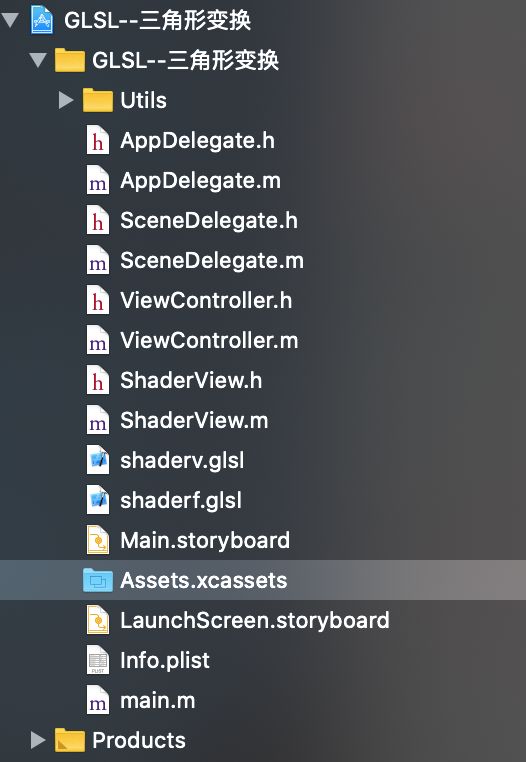前面我们有使用OpenGL来实现绘制可旋转的金字塔,现在我们来使用OpenGL ES实现同样的效果,然后再实现金字塔贴上纹理并和颜色混合的效果。
一、最终结果以及准备工作
我们用到了一个三方的OpenGL ES的矩阵库,类似的矩阵库很多,可以github上搜索。
二、GLSL实现
代码主体和上一个案例一样,我们自定义两个着色器:顶点着色器shaderv.glsl 和片源着色器shaderf.glsl,再自定义一个ShaderView,并指定为当面Viewcontroller的view。
工程结构:
1.shaderv.glsl代码:
attribute vec4 position;
attribute vec4 positionColor;
uniform mat4 projectionMatrix;
uniform mat4 modelViewMatrix;
varying lowp vec4 varyColor;
void main()
{
varyColor = positionColor;
vec4 vPos;
//4*4 * 4*4 * 4*1
vPos = projectionMatrix * modelViewMatrix * position;
gl_Position = vPos;
}
在顶点着色器里面,我们实现了将顶点颜色通过
varyColor传递到片源着色器中,然后通过透视矩阵projectionMatrix和模型视图矩阵modelViewMatrix左乘我们的顶点坐标来得到最后变换后的坐标位置。
2.shaderf.glsl代码:
precision highp float;
varying lowp vec4 varyColor;
void main()
{
gl_FragColor = varyColor;
}
>片源着色器很简单,拿到从顶点着色器传递过来的颜色数据,直接运用即可。
3. ShaderView代码
接下来我们,着重看下ShaderView里面的代码,因为要控制金字塔的旋转,所以我们需要定义几个成员变量:
@implementation ShaderView{
CGFloat xDegree; //X轴旋转角度
CGFloat yDegree; //Y轴旋转角度
CGFloat zDegree; //Z轴旋转角度
BOOL isXRotate;
BOOL isYRotate;
BOOL isZRotate;
NSTimer* myTimer;
}
然后依然和上一个案例一样,重写layoutSubviews方法,实现6步:
-(void)layoutSubviews
{
//1.设置图层
[self setupLayer];
//2.设置上下文
[self setupContext];
//3.清空缓存区
[self deletBuffer];
//4.设置renderBuffer;
[self setupRenderBuffer];
//5.设置frameBuffer
[self setupFrameBuffer];
//6.绘制
[self render];
}
前五部都一样,我们重点看第六步代码实现:
-(void)render
{
//1.清屏颜色
glClearColor(0, 0.0, 0, 1.0);
glClear(GL_COLOR_BUFFER_BIT);
CGFloat scale = [[UIScreen mainScreen] scale];
//2.设置视口
glViewport(self.frame.origin.x * scale, self.frame.origin.y * scale, self.frame.size.width * scale, self.frame.size.height * scale);
//3.获取顶点着色程序、片元着色器程序文件位置
NSString* vertFile = [[NSBundle mainBundle] pathForResource:@"shaderv" ofType:@"glsl"];
NSString* fragFile = [[NSBundle mainBundle] pathForResource:@"shaderf" ofType:@"glsl"];
//4.判断self.myProgram是否存在,存在则清空其文件
if (self.myProgram) {
glDeleteProgram(self.myProgram);
self.myProgram = 0;
}
//5.加载程序到myProgram中来。
self.myProgram = [self loadShader:vertFile frag:fragFile];
//6.链接
glLinkProgram(self.myProgram);
GLint linkSuccess;
//7.获取链接状态
glGetProgramiv(self.myProgram, GL_LINK_STATUS, &linkSuccess);
if (linkSuccess == GL_FALSE) {
GLchar messages[256];
glGetProgramInfoLog(self.myProgram, sizeof(messages), 0, &messages[0]);
NSString *messageString = [NSString stringWithUTF8String:messages];
NSLog(@"error%@", messageString);
return ;
}else {
glUseProgram(self.myProgram);
}
//8.创建顶点数组 & 索引数组
//(1)顶点数组 前3顶点值(x,y,z),后3位颜色值(RGB)
GLfloat attrArr[] =
{
-0.5f, 0.5f, 0.0f, 1.0f, 0.0f, 1.0f, 0.0f, 1.0f, //左上0
0.5f, 0.5f, 0.0f, 1.0f, 0.0f, 1.0f, 1.0f, 1.0f,//右上1
-0.5f, -0.5f, 0.0f, 1.0f, 1.0f, 1.0f, 0.0f, 0.0f,//左下2
0.5f, -0.5f, 0.0f, 1.0f, 1.0f, 1.0f, 1.0f, 0.0f,//右下3
0.0f, 0.0f, 1.0f, 0.0f, 1.0f, 0.0f, 0.5f, 0.5f,//顶点4
};
//(2).索引数组
GLuint indices[] =
{
0, 3, 2,
0, 1, 3,
0, 2, 4,
0, 4, 1,
2, 3, 4,
1, 4, 3,
};
//(3).判断顶点缓存区是否为空,如果为空则申请一个缓存区标识符
if (self.myVertices == 0) {
glGenBuffers(1, &_myVertices);
}
//9.-----处理顶点数据-------
//(1).将_myVertices绑定到GL_ARRAY_BUFFER标识符上
glBindBuffer(GL_ARRAY_BUFFER, _myVertices);
//(2).把顶点数据从CPU内存复制到GPU上
glBufferData(GL_ARRAY_BUFFER, sizeof(attrArr), attrArr, GL_DYNAMIC_DRAW);
//(3).将顶点数据通过myPrograme中的传递到顶点着色程序的position
//1.glGetAttribLocation,用来获取vertex attribute的入口的.
//2.告诉OpenGL ES,通过glEnableVertexAttribArray,
//3.最后数据是通过glVertexAttribPointer传递过去的。
//注意:第二参数字符串必须和shaderv.vsh中的输入变量:position保持一致
GLuint position = glGetAttribLocation(self.myProgram, "position");
//(4).打开position
glEnableVertexAttribArray(position);
//(5).设置读取方式
//参数1:index,顶点数据的索引
//参数2:size,每个顶点属性的组件数量,1,2,3,或者4.默认初始值是4.
//参数3:type,数据中的每个组件的类型,常用的有GL_FLOAT,GL_BYTE,GL_SHORT。默认初始值为GL_FLOAT
//参数4:normalized,固定点数据值是否应该归一化,或者直接转换为固定值。(GL_FALSE)
//参数5:stride,连续顶点属性之间的偏移量,默认为0;
//参数6:指定一个指针,指向数组中的第一个顶点属性的第一个组件。默认为0
glVertexAttribPointer(position, 3, GL_FLOAT, GL_FALSE, sizeof(GLfloat) * 8, NULL);
//10.--------处理顶点颜色值-------
//(1).glGetAttribLocation,用来获取vertex attribute的入口的.
//注意:第二参数字符串必须和shaderv.glsl中的输入变量:positionColor保持一致
GLuint positionColor = glGetAttribLocation(self.myProgram, "positionColor");
//(2).设置合适的格式从buffer里面读取数据
glEnableVertexAttribArray(positionColor);
//(3).设置读取方式
//参数1:index,顶点数据的索引
//参数2:size,每个顶点属性的组件数量,1,2,3,或者4.默认初始值是4.
//参数3:type,数据中的每个组件的类型,常用的有GL_FLOAT,GL_BYTE,GL_SHORT。默认初始值为GL_FLOAT
//参数4:normalized,固定点数据值是否应该归一化,或者直接转换为固定值。(GL_FALSE)
//参数5:stride,连续顶点属性之间的偏移量,默认为0;
//参数6:指定一个指针,指向数组中的第一个顶点属性的第一个组件。默认为0
glVertexAttribPointer(positionColor, 3, GL_FLOAT, GL_FALSE, sizeof(GLfloat) * 8, (float *)NULL + 3);
//11.找到myProgram中的projectionMatrix、modelViewMatrix 2个矩阵的地址。如果找到则返回地址,否则返回-1,表示没有找到2个对象。
GLuint projectionMatrixSlot = glGetUniformLocation(self.myProgram, "projectionMatrix");
GLuint modelViewMatrixSlot = glGetUniformLocation(self.myProgram, "modelViewMatrix");
float width = self.frame.size.width;
float height = self.frame.size.height;
//12.创建4 * 4投影矩阵
KSMatrix4 _projectionMatrix;
//(1)获取单元矩阵
ksMatrixLoadIdentity(&_projectionMatrix);
//(2)计算纵横比例 = 长/宽
float aspect = width / height; //长宽比
//(3)获取透视矩阵
/*
参数1:矩阵
参数2:视角,度数为单位
参数3:纵横比
参数4:近平面距离
参数5:远平面距离
参考PPT
*/
ksPerspective(&_projectionMatrix, 30.0, aspect, 5.0f, 20.0f); //透视变换,视角30°
//(4)将投影矩阵传递到顶点着色器
/*
void glUniformMatrix4fv(GLint location, GLsizei count, GLboolean transpose, const GLfloat *value);
参数列表:
location:指要更改的uniform变量的位置
count:更改矩阵的个数
transpose:是否要转置矩阵,并将它作为uniform变量的值。必须为GL_FALSE
value:执行count个元素的指针,用来更新指定uniform变量
*/
glUniformMatrix4fv(projectionMatrixSlot, 1, GL_FALSE, (GLfloat*)&_projectionMatrix.m[0][0]);
//13.创建一个4 * 4 矩阵,模型视图矩阵
KSMatrix4 _modelViewMatrix;
//(1)获取单元矩阵
ksMatrixLoadIdentity(&_modelViewMatrix);
//(2)平移,z轴平移-10
ksTranslate(&_modelViewMatrix, 0.0, 0.0, -10.0);
//(3)创建一个4 * 4 矩阵,旋转矩阵
KSMatrix4 _rotationMatrix;
//(4)初始化为单元矩阵
ksMatrixLoadIdentity(&_rotationMatrix);
//(5)旋转
ksRotate(&_rotationMatrix, xDegree, 1.0, 0.0, 0.0); //绕X轴
ksRotate(&_rotationMatrix, yDegree, 0.0, 1.0, 0.0); //绕Y轴
ksRotate(&_rotationMatrix, zDegree, 0.0, 0.0, 1.0); //绕Z轴
//(6)把变换矩阵相乘.将_modelViewMatrix矩阵与_rotationMatrix矩阵相乘,结合到模型视图
ksMatrixMultiply(&_modelViewMatrix, &_rotationMatrix, &_modelViewMatrix);
//(7)将模型视图矩阵传递到顶点着色器
/*
void glUniformMatrix4fv(GLint location, GLsizei count, GLboolean transpose, const GLfloat *value);
参数列表:
location:指要更改的uniform变量的位置
count:更改矩阵的个数
transpose:是否要转置矩阵,并将它作为uniform变量的值。必须为GL_FALSE
value:执行count个元素的指针,用来更新指定uniform变量
*/
glUniformMatrix4fv(modelViewMatrixSlot, 1, GL_FALSE, (GLfloat*)&_modelViewMatrix.m[0][0]);
//14.开启剔除操作效果
glEnable(GL_CULL_FACE);
//15.使用索引绘图
/*
void glDrawElements(GLenum mode,GLsizei count,GLenum type,const GLvoid * indices);
参数列表:
mode:要呈现的画图的模型
GL_POINTS
GL_LINES
GL_LINE_LOOP
GL_LINE_STRIP
GL_TRIANGLES
GL_TRIANGLE_STRIP
GL_TRIANGLE_FAN
count:绘图个数
type:类型
GL_BYTE
GL_UNSIGNED_BYTE
GL_SHORT
GL_UNSIGNED_SHORT
GL_INT
GL_UNSIGNED_INT
indices:绘制索引数组
*/
glDrawElements(GL_TRIANGLES, sizeof(indices) / sizeof(indices[0]), GL_UNSIGNED_INT, indices);
//16.要求本地窗口系统显示OpenGL ES渲染<目标>
[self.myContext presentRenderbuffer:GL_RENDERBUFFER];
}
- 在
render方法里面我们使用了新的索引绘图方式实现金字塔的绘制 - 因为要旋转金字塔,所以我们使用了透视矩阵和模型视图矩阵
再次提醒,需要重写
+ (Class)layerClass方法,否则会失败。
4.旋转逻辑事件
为了实现金字塔的旋转,我们新建三个Button并实现它们的点击事件:
#pragma mark -- actions
- (IBAction)xRotate:(id)sender {
[self startTimer];
isXRotate = !isXRotate;
}
- (IBAction)yRotate:(id)sender {
[self startTimer];
isYRotate = !isYRotate;
}
- (IBAction)zRotate:(id)sender {
[self startTimer];
isZRotate = !isZRotate;
}
- (void)startTimer{
//开启定时器
if (!myTimer) {
myTimer = [NSTimer scheduledTimerWithTimeInterval:0.05 target:self selector:@selector(reDegree) userInfo:nil repeats:YES];
}
}
-(void)reDegree
{
//如果停止X轴旋转,X = 0则度数就停留在暂停前的度数.
//更新度数
xDegree += isXRotate * 5;
yDegree += isYRotate * 5;
zDegree += isZRotate * 5;
//重新渲染
[self render];
}
ok,这样我们就实现了绘制一个可旋转的金字塔。运行一下:
三、GLKit实现
GLK实现相对简单很多,我们不需要单独编写顶点着色器和片源着色器文件,先配置工程
1.工程配置
- 新建工程
- 在
ViewController引入#import并修改ViewController继承于GLKViewController
#import
#import
@interface ViewController : GLKViewController
@end
- 修改
Main.storyboard中view的Class为GLKView
2.代码实现
- 定义属性和成员变量:
@interface ViewController ()
@property(nonatomic,strong)EAGLContext *mContext;
@property(nonatomic,strong)GLKBaseEffect *mEffect;
@property(nonatomic,assign)int count;
//旋转的度数
@property(nonatomic,assign)float XDegree;
@property(nonatomic,assign)float YDegree;
@property(nonatomic,assign)float ZDegree;
//是否旋转X,Y,Z
@property(nonatomic,assign) BOOL isXRotate;
@property(nonatomic,assign) BOOL isYRotate;
@property(nonatomic,assign) BOOL isZRotate;
@end
@implementation ViewController{
dispatch_source_t myTimer;
}
- 新建图层
- (void)setupContext{
//1.新建OpenGL ES上下文
self.mContext = [[EAGLContext alloc]initWithAPI:kEAGLRenderingAPIOpenGLES2];
GLKView *view = (GLKView *)self.view;
view.context = self.mContext;
view.drawableColorFormat = GLKViewDrawableColorFormatRGBA8888;
view.drawableDepthFormat = GLKViewDrawableDepthFormat24;
[EAGLContext setCurrentContext:self.mContext];
glEnable(GL_DEPTH_TEST);
}
- 渲染图形
- (void)render{
GLfloat attrArr[] =
{
-0.5f, 0.5f, 0.0f, 1.0f, 0.0f, 1.0f, //左上
0.5f, 0.5f, 0.0f, 1.0f, 0.0f, 1.0f, //右上
-0.5f, -0.5f, 0.0f, 1.0f, 1.0f, 1.0f, //左下
0.5f, -0.5f, 0.0f, 1.0f, 1.0f, 1.0f, //右下
0.0f, 0.0f, 1.0f, 0.0f, 1.0f, 0.0f, //顶点
};
//2.绘图索引
GLuint indices[] =
{
0, 3, 2,
0, 1, 3,
0, 2, 4,
0, 4, 1,
2, 3, 4,
1, 4, 3,
};
//顶点个数
self.count = sizeof(indices) /sizeof(GLuint);
//将顶点数组放入数组缓冲区中 GL_ARRAY_BUFFER
GLuint buffer;
glGenBuffers(1, &buffer);
glBindBuffer(GL_ARRAY_BUFFER, buffer);
glBufferData(GL_ARRAY_BUFFER, sizeof(attrArr), attrArr, GL_STATIC_DRAW);
//将索引数组存储到索引缓冲区 GL_ELEMENT_ARRAY_BUFFER
GLuint index;
glGenBuffers(1, &index);
glBindBuffer(GL_ELEMENT_ARRAY_BUFFER, index);
glBufferData(GL_ELEMENT_ARRAY_BUFFER, sizeof(indices), indices, GL_STATIC_DRAW);
//使用顶点数据
glEnableVertexAttribArray(GLKVertexAttribPosition);
glVertexAttribPointer(GLKVertexAttribPosition, 3, GL_FLOAT, GL_FALSE, sizeof(GLfloat) * 6, NULL);
//使用颜色数据
glEnableVertexAttribArray(GLKVertexAttribColor);
glVertexAttribPointer(GLKVertexAttribColor, 3, GL_FLOAT, GL_FALSE, sizeof(GLfloat) * 6, (GLfloat *)NULL + 3);
//着色器
self.mEffect = [[GLKBaseEffect alloc]init];
//投影视图
CGSize size = self.view.bounds.size;
float aspect = fabs(size.width / size.height);
GLKMatrix4 projectionMatrix = GLKMatrix4MakePerspective(GLKMathDegreesToRadians(90.0), aspect, 0.1f, 100.0);
projectionMatrix = GLKMatrix4Scale(projectionMatrix, 1.0f, 1.0f, 1.0f);
self.mEffect.transform.projectionMatrix = projectionMatrix;
//模型视图
GLKMatrix4 modelViewMatrix = GLKMatrix4Translate(GLKMatrix4Identity, 0.0f, 0.0f, -2.0f);
self.mEffect.transform.modelviewMatrix = modelViewMatrix;
//定时器
double seconds = 0.1;
myTimer = dispatch_source_create(DISPATCH_SOURCE_TYPE_TIMER, 0, 0, dispatch_get_main_queue());
dispatch_source_set_timer(myTimer, DISPATCH_TIME_NOW, seconds * NSEC_PER_SEC, 0.0);
dispatch_source_set_event_handler(myTimer, ^{
self.XDegree += self.isXRotate * 0.1f;
self.YDegree += self.isYRotate * 0.1f;
self.ZDegree += self.isZRotate * 0.1f;
});
dispatch_resume(myTimer);
}
- 新增三个Button并添加点击事件
#pragma mark -- actions
- (IBAction)xRotate:(id)sender {
self.isXRotate = !self.isXRotate;
}
- (IBAction)yRotate:(id)sender {
self.isYRotate = !self.isYRotate;
}
- (IBAction)zRotate:(id)sender {
self.isZRotate = !self.isZRotate;
}
- 实现GLKViewController 和GLKView的代理方法
#pragma mark - Delegate
- (void)update{
GLKMatrix4 modelViewMatrix = GLKMatrix4Translate(GLKMatrix4Identity, 0.0f, 0.0f, -2.5f);
modelViewMatrix = GLKMatrix4RotateX(modelViewMatrix, self.XDegree);
modelViewMatrix = GLKMatrix4RotateY(modelViewMatrix, self.YDegree);
modelViewMatrix = GLKMatrix4RotateZ(modelViewMatrix, self.ZDegree);
self.mEffect.transform.modelviewMatrix = modelViewMatrix;
}
- (void)glkView:(GLKView *)view drawInRect:(CGRect)rect{
glClearColor(0.3f, 0.3f, 0.3f, 1.0f);
glClear(GL_COLOR_BUFFER_BIT | GL_DEPTH_BUFFER_BIT);
[self.mEffect prepareToDraw];
glDrawElements(GL_TRIANGLES, self.count, GL_UNSIGNED_INT, 0);
}
接下来,运行工程即可。
觉得不错记得点赞哦!听说看完点赞的人逢考必过,逢奖必中。ღ( ´・ᴗ・` )比心


